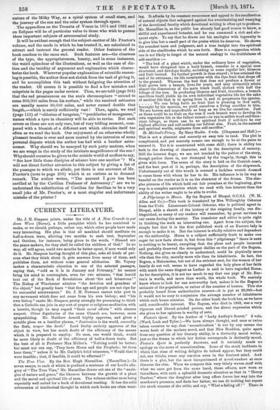The True Vine. By the Rev. Hugh Macmillan. (Macmillan.)—In seven
essays, to each of which is prefixed a sentence of our Lord's alle- gory of "The True Vine," Mr. Macmillan draws out one of tho "analo- gies of nature and grace," the likeness between the growth of a plant and the moral and spiritual life of man. The volume strikes us as being especially well suited for a book of devotional reading. It has the solid substratum of intellectual thought in which such books are often want-
ing. It affords by its constant recurrence and appeal to the recollection of natural objects that safeguard against the overstraining and wearying
of the devotional faculty which devotional writing is often apt to produce. Mr. Macmillan is, as the public has already had good reason to know, a skilful and experienced botanist, and he can command a rich and elo-
quent style. To say that he draws out his analogies with ingenuity is to give him but a small part of the praise which he deserves. He shows the soundest taste and judgment, and a true insight into the spiritual side of the similitudes which he sets forth. Here is a suggestion which one is not likely to forget of the natural analogy to the fruitfulness of self-sacrifice :—
" The bud of a plant which, under the ordinary laws of vegetation, would have elongated into a leafy branch, remains in a special case shortened, and develops finally, according to some regular law, blossom and fruit instead. Its further growth is thus stayed ; it has attained the end of its existence ; its life terminates with the ripe fruit that drops off to the ground. Whereas the bud that does not produce a flower or
fruit grows into a branch, lives for years, and may ultimately attain almost the dimensions of the main trunk itself, clothed with half the foliage of the tree. In producing blossom and fruit, therefore, a branch sacrifices itself, yields up its own individual vegetative life for the sake of another life that is to spring from it, and to perpetuate the species. We can bring forth no fruit that is pleasing to God until,
besought by his mercies, we yield ourselves a living sacrifice to him. Wo are barren and unprofitable as long as we live for ourselves. Just as there could be no fruit on the tree if each branch were to develop its own vegetative life to the fullest extent—to run to selfish wood and luxu- riant foliage, so there can be no spiritual fruit if self-love be our highest affection and self-seeking our loftiest aim. Fruit, in the natural and spiritual worlds, originates from self-sacrifice."


































 Previous page
Previous page